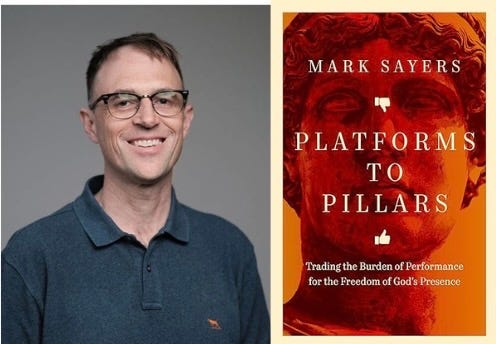240 pages, Moody Publishers
“You need a platform of 10,000 for us to work with you. Do you have a platform that large?”
I’ve always wanted to write and create for Jesus—but the idea of platform has often been a struggle.
-
How do I promote Jesus without promoting myself?
-
If I promote myself, am I really promoting Jesus?
-
Where’s the line between God-promotion and self-promotion?
-
And if I don’t have a large audience, does that mean what I create isn’t good?
Over the years, a few generous sponsors have supported my work; however, my audience has never reached the metrics that publishers and sponsors typically desire. The irony? In trying to build a platform for Jesus, I’ve often felt tempted to build one for myself.
But is that what Jesus has called us to?
He had some sobering words for those of us who crave the spotlight:
-
“Everything they do is done for people to see… they love the place of honor at banquets and the most important seats in the synagogues…”—Matthew 23:5–7
-
“How can you believe since you accept glory from one another but do not seek the glory that comes from the only God?”—John 5:44
-
“…for they loved human praise more than praise from God.”—John 12:43
How do you promote truth in a world of competing platforms when the faith you proclaim tells you that to be first, you must be last?
I started in ministry before platforms were a thing. Sure, they’ve always existed in some form—but not at the scale and saturation we see today. We now live in a world dominated by platforms—not just TikTok and YouTube, but platforms of personality, performance, and productivity.
We curate our lives. We hustle for attention. And let’s be honest—the church isn’t immune.
In fact, the church may be more vulnerable to the platform mentality for two reasons:
-
There’s always the subtle danger of selfish motives hiding behind a veneer of godly pursuits.
-
As Christianity declines and is increasingly marginalized in the West, many Christian leaders feel like they’re drowning, desperate to be lifted and heard.
Both dynamics feed the platform obsession.
And beneath it all lies a deeper question:
What kind of people are we becoming?
The Problem of Platform
In Platforms to Pillars: Trading the Burden of Performance for the Freedom of God’s Presence, cultural commentator and pastor Mark Sayers offers a deeply insightful and prophetic critique of the platform mentality—and presents a hopeful alternative.
This isn’t just a book for ministry leaders. It’s for anyone who senses something is deeply off in the way we “do” influence today.
Sayers begins with a diagnosis: the church has become captive to a platform mindset—a way of life that promises affirmation, fulfillment, and visibility (p. 20). He traces its rise over the past few decades, accelerated by digital platforms that amplify individual expression while bypassing the institutional formation that once shaped public influence.
To frame this shift, Sayers draws a parallel with ancient Israel in Egypt: a new Pharaoh arose who did not know Joseph (p. 23). Likewise, our new platform culture no longer recognizes the rootedness, tradition, and communal authority that once gave depth to Christian witness.
Instead, we chase personal expression—only to be disillusioned when it collides with real-world limits (p. 22).
Sayers calls this not just a trend, but the emergence of a platform society (p. 23).
The Possibility of Pillars
In contrast, Sayers casts a biblical vision: spiritual pillars (p. 29). Drawing from Aboriginal eldership traditions in Australia—where wisdom, not force, shaped influence—he envisions a community centered not on performance but on depth.
Though he avoids the word elder to prevent confusion with formal church roles, the point is clear: spiritual maturity matters more than visibility metrics.
Platforms often bypass the slow process of wisdom and character. They elevate voices before those voices are ready. Viral success does not equal spiritual depth. Emotional pull and charisma often outpace substance and truth.
Pillars, by contrast, influence from below. Their lives are marked by:
-
Contagious devotion (p. 32)
-
Relational connection (p. 33)
-
Sacrificial perseverance (p. 33)
-
Creating space for others to thrive in God (p. 34)
-
Partnering with God to build His temple on earth (p. 36)
This is a different kind of influence—one not built on algorithms but on abiding.
Structure and Themes
Sayers lays out his argument in five sections:
-
Part 1: Introduces the contrast between platforms and pillars.
-
Part 2: Traces the rise of the platform age and its emotional, spiritual effects (pp. 41–62).
-
Part 3: Offers a biblical lens to uncover the deeper forces at play (pp. 63–74).
-
Part 4: Leverages the themes of Exorcism, Exodus, and Exile to reframe our journey (pp. 135–170).
-
Part 5: Points toward the future—a hopeful vision of spiritual formation and generational faithfulness (p. 175).
At the heart of his hope is the concept of paradosis—the passing down of wisdom across generations (p. 182). Without pillars to steward and transmit that wisdom, the church and the culture risk collapse.
Strengths
Sayers brings a unique, prophetic eye to our cultural moment. His diagnosis of the platform mindset is one of the clearest and most convicting I’ve encountered. He not only names the forces we face—he uncovers the spiritual hunger driving them.
At times, I felt like I was in a counseling session—seeing myself and my own ministry story reflected back to me in ways that made my jaw drop. It was eerie—but in a good way.
Parts 1–3 are especially strong. The contrast between platforms and pillars isn’t just helpful—it’s necessary.
Weaknesses
I found Parts 4 and 5 less practical. While the theological themes—Exorcism, Exodus, and Exile—are rich, they feel disconnected a bit at times. I struggled to translate them into actionable rhythms in daily life.
His section on paradosis is compelling, but I wished he had explored the role of family and intergenerational relationships more deeply. Here, I found myself thinking of Christian Smith’s Why Religion Went Obsolete, particularly his insights into the breakdown of family-based faith transmission. Sayers doesn’t mention this, but to be fair, that wasn’t the crux of his argument. However, I wanted more practicalities on how paradosis can be accomplished.
Final Thoughts
Mark Sayers has given the church a timely and prophetic word.
In a world obsessed with platforms—where performance overshadows presence—Platforms to Pillars calls us to a deeper, quieter, more faithful way of being—a perfect complement to anyone seeking to do cultural apologetics.
At Apollos Watered, we define cultural apologetics as:
The work of establishing the Christian imagination, conscience, voice, and practice within a culture so that Christianity can be seen as true and satisfying.
This requires:
-
Analyzing the deep structures of both church culture and broader culture
-
Understanding how these structures affect the viability and communicability of the gospel
-
Redeploying the church in ways that are faithful to Christ and responsive to the cultural moment
Sayers’ work embodies this mission. He exposes how the modern world subtly shapes our imaginations—even in ministry—and calls us to become something different: a new creation community formed through multigenerational faithfulness and rooted presence. A timely and welcome truth.
💧 The Apollos Watered Rating: 💧💧💧💧💧 — 5 Drops — Must Read: This book belongs in your library. It will definitely water your faith and your world.
While I wrestled with the final two sections, the first three are strong enough to carry the entire book. His argument and insight are that strong. Seriously. I haven’t encountered anyone who has been able to identify and diagnose the spiritual impulses at work in a platform mentality and our platform society. I’ve found myself returning to key passages repeatedly, underlining and reflecting.
If you’re a pastor, content creator, parent, or a disciple longing for more, Platforms to Pillars is for you.


